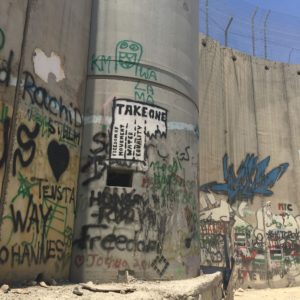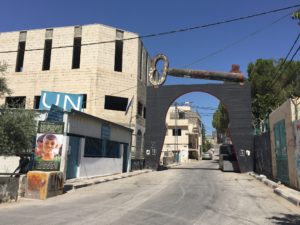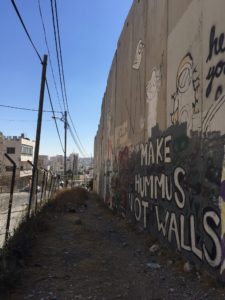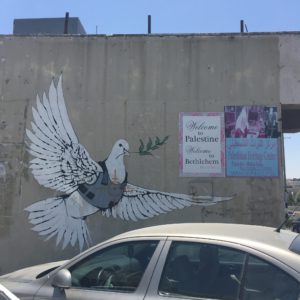Reflections from a Political Tour in Bethlehem
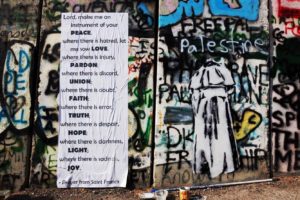 In July, I went on a 5-hour tour with an Immersion group from the U.S., led by a Palestinian tour guide. The focus of the tour was the geopolitical situation in Israel/Palestine (especially Bethlehem and its surroundings). I am going to split this post into 2 sections: first, some of the most shocking pieces of information from our local guide, and second, some of my personal reflections during and after the tour. I am immensely fortunate to have been able to visit this land twice already and learn about the situation from those who are experiencing it firsthand. That being said, I feel that it is my duty to share the information I have learned, so that you will be informed, reflect a little and maybe even have a heart for this part of the world as well.
In July, I went on a 5-hour tour with an Immersion group from the U.S., led by a Palestinian tour guide. The focus of the tour was the geopolitical situation in Israel/Palestine (especially Bethlehem and its surroundings). I am going to split this post into 2 sections: first, some of the most shocking pieces of information from our local guide, and second, some of my personal reflections during and after the tour. I am immensely fortunate to have been able to visit this land twice already and learn about the situation from those who are experiencing it firsthand. That being said, I feel that it is my duty to share the information I have learned, so that you will be informed, reflect a little and maybe even have a heart for this part of the world as well.
First, I'd like to relay the knowledge from our Palestinian tour guide, especially the parts that I found the most shocking or difficult to swallow. Since our guide did take a side (obviously), this information may be taken with a grain of salt. However, if you can find a source more reliable than a politically aware Palestinian who is facing these issues firsthand, I welcome your correction.
- In Israel, people are encouraged to remember atrocities in Jewish history, such as the Holocaust (see: the Holocaust Museum in Jerusalem). But Palestinians in Israel are not allowed to commemorate, or really even talk about, the Nakba (“catastrophe” in Arabic). This was the major event in Palestinian history when 750,000 Palestinians were expelled from their homes to make room for the creation of the State of Israel in 1948.
- Water tanks. One way to differentiate between Palestinian homes and Israeli/settler homes here is to see that the Palestinian ones inevitably have these cylindrical tanks sitting on their roofs. I was shocked to find out that running water and greenery are scarce here in the West Bank, not because there is no natural water, but because Israel controls the supply. 80% of it goes to Israelis, who sell it to the Palestinians and arbitrarily cut off the supply, sometimes for periods as long as 40 days (water just started flowing again in Beit Sahur). Because of this situation, Palestinians store up water in these tanks to use when the supply is cut. Others may point to these tanks as evidence that “those Palestinians are greedy; they even want to hoard water for themselves”.
- The wall. When you arrive in Bethlehem, one thing you will not be able to ignore is the huge, 8-meter tall concrete wall that separates the West Bank from Jerusalem/Israel. Our tour guide emphasized that the wall is not a “border”. When countries are separated via borders, each country has its own sovereignty and set of laws that apply to their own side. Here, Israeli laws and military enforcement are applied to both sides of the wall. It is more accurately a separation barrier to keep “dangerous Palestinians” out of Israel. Oh, and it also cuts off 1/3 of Palestinian land in Beit Sahur from being cultivated, and coincidentally takes over the street that used to be the biggest economic hub in Bethlehem.
4. Settlements? Israel continuously moves into the land of the West Bank by building these large residential compounds that are segregated and “protected” from Palestinians through military means. Specifically, this means tall, orderly apartment buildings being constructed in the designated Palestinian territories to house Israeli settlers, channel away Palestinian water and resources, and allow more soldiers to infiltrate the West Bank in the name of security. Benefits such as subsidies and tax cuts are given to entice Israelis to live in a settlement, the existence of which is already illegal under international law.
5. Refugee camps. The UN has a whole agency specifically for Palestinian refugees–UNRWA (United Nations Relief and Works Agency)–that was founded one year before UNHCR and now assists the lives of over 5 million registered Palestinian refugees. The peculiar thing about these refugees is that they have been displaced within their own country, having been evacuated from their generational homes 60 some years ago and moved into refugee camps to make room for the incoming Israelis. When we arrived at Aida Camp in Bethlehem, a noticeable symbol drawn on the walls was a key, specifically, the key to one’s home. The tour guide explained that when these Palestinians were forcibly expelled from their land, all they had left of their homes and properties were these keys. I don’t know why, but this imagery just suddenly made me internalize the enormous injustice of such a situation. Each of us carries our own key when we leave the house, and I can only imagine what it would feel like to be still carrying that key and suddenly be forbidden from reclaiming or returning to home again.
The central question in my thoughts both during and after this tour goes something like this: How was this even allowed to happen, and why isn’t anyone doing anything about it now? Even as I wrote this post, I was pretty shocked to discover that everything our tour guide mentioned has been openly covered by reputable sources in the media, and yet I (and I am assuming a lot more people) still had no idea of the amount of injustice that is going on here. I am not saying that one side is evil, or that the other is completely good and righteous, but I am saying that when occupation, legal racial/religious discrimination, and blatant violation of international law are all present in one conflict, to the obvious disadvantage of one side versus the other, the world has a responsibility to react. But in our privilege and silence, we have all been complicit.
Lastly, I want to share something else that was going through my head during this intensive, overwhelming tour. I think that meeting the people who are suffering and getting to see the goodness inside of them is really game-changing. You can hear about injustices, such as apartheid and other oppressive policies. But prejudice, indifference, the busyness, or the natural selfishness of your own life can get the better of you. From my own experience, only when you make personal connections with those who are suffering, feel their goodness and loving care, and see them as people who are just as “good,” and often better than yourself, that is when your heart changes and begins to ache for them. Otherwise, we can always acknowledge the brokenness in the world and shrug it off, without feeling anything about it.
People are not bad. But I would not say they are good either. I think I am undecided. People make mistakes, and the consequences of these can turn out to be gigantic and horrendous. In any case, it is not anyone’s role to decide that one person is better than another, more deserving of rights like flowing water and freedom of movement, or that one culture is too different for another to even attempt to understand. In our basic human desires, our compassion and our weaknesses, we are all the same.


